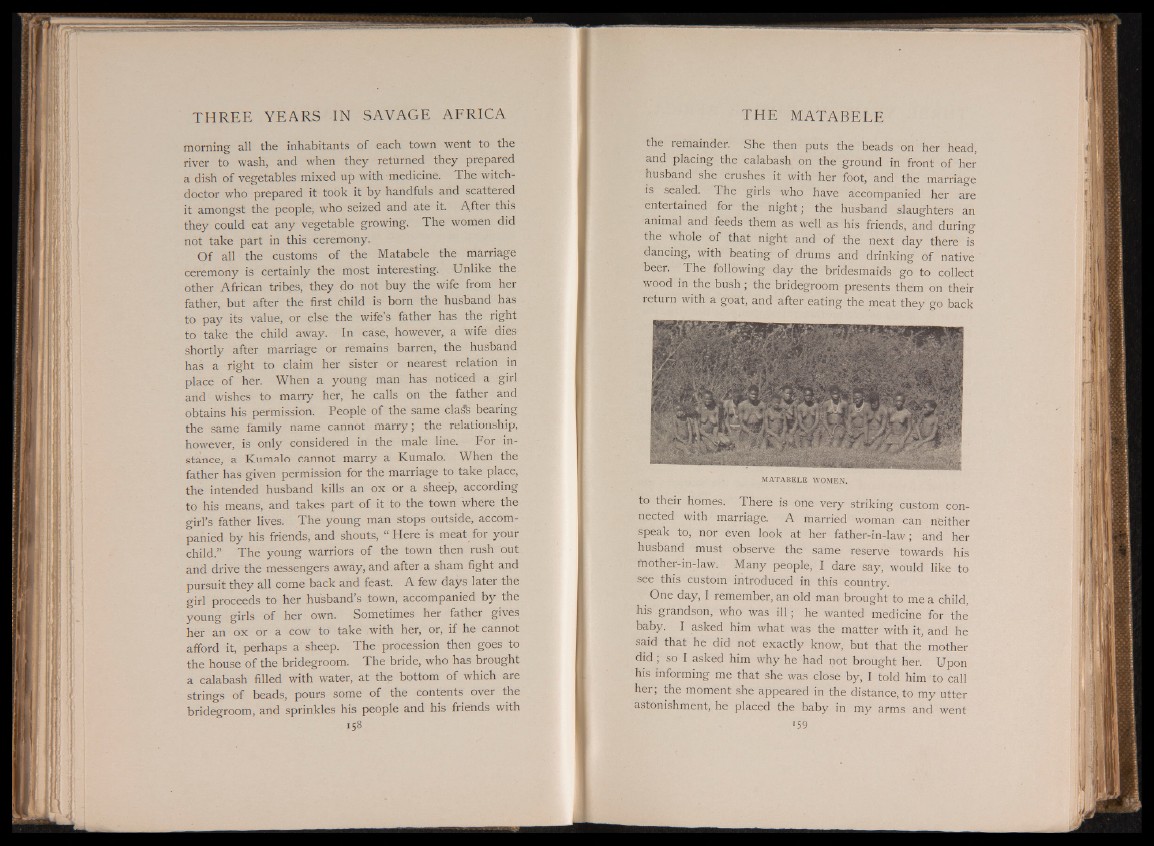
morning all the inhabitants of each town went to the
river to wash, and when they returned they prepared
a dish of vegetables mixed up with medicine. The witchdoctor
who prepared it took it by handfuls and scattered
it amongst the people; who seized and ate it. After this
they could eat any vegetable growing. The women did
not take part in this ceremony.
Of all the customs of the Matabele the marriage
ceremony is certainly the most interesting. Unlike the
other African tribes, they do not buy the wife from her
father, but after the first child is born the husband has
to pay its value, or else the wife’s father has the right
to take the child away. In case, however, a wife dies
shortly after marriage or remains barren, the husband
has a right to claim her sister or nearest relation in
place of her. When a young man has noticed a girl
and wishes to marry her, he calls on the father and
obtains his permission. People of the same claife bearing
the same family name cannot marry; the relationship,
however, is only considered in the male line. For instance,
a Kumalo cannot marry a Kumalo. When the
father has given permission for the marriage to take place,
the intended husband kills an ox or a sheep, according
to his means, and takes part of it to the town where the
girl’s father lives. The young man stops outside, accompanied
by his friends, and shouts, “ Here is meat for your
child.” The young warriors of the town then rush out
and drive the messengers away, and after a sham fight and
pursuit they all come back and feast. A few days later the
girl proceeds to her husband’s town, accompanied by the
young girls of her own. Sometimes her father gives
her an ox or a cow to take with her, or, if he cannot
afford it, perhaps a sheep. The procession then goes to
the house of the bridegroom. The bride, who has brought
a calabash filled with water, at the bottom of which are
strings of beads, pours some of the contents over the
bridegroom, and sprinkles his people and his friends with
158
the remainder. She then puts the beads on her head,
and placing the calabash on the ground in front of her
husband she crushes it with her foot, and the marriage
is sealed. The girls who have accompanied her are
entertained for the night; the husband slaughters an
animal and feeds them as well as his friends, and during
the whole of that night and of the next day there is
dancing, with beating of drums and drinking of native
beer. The following day the bridesmaids go to collect
wood in the bush; the bridegroom presents them on their
return with a goat, and after eating the meat they go back
MATABELE WOMEN.
to their homes. There is one very striking custom connected
with marriage. A married woman can neither
speak to, nor even look at her father-in-law; and her
husband must observe the same reserve towards his
mother-in-law. Many people, I dare say, would like to
see this custom introduced in this country.
One day, I remember, an old man brought to me a child,
his grandson, who was ill; he wanted medicine for the
baby. I asked him what was the matter with it, and he
said that he did not exactly know, but that the mother
did; so I asked him why he had not brought her. Upon
his informing me that she was close by, I told him to call
her; the moment she appeared in the distance, to my utter
astonishment, he placed the baby in my arms and went
‘59